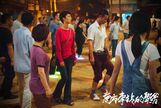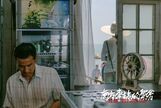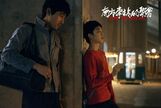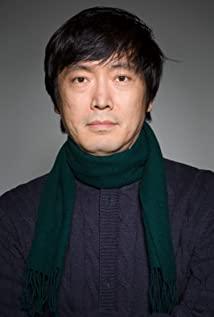Diao Yinan, who "walks around", told the audience in the auditorium inexplicably a story of "One Thousand and One Nights" in the Q&A after the premiere of "The Gathering at Southern Station" New York Film Festival, to the effect that he likes structure His interest, and the stories in "A Thousand and One Nights" follow stories, and the form of story-to-story is right in his liking. He went on to say, "If the story is not told well, you will be killed the next day." The teacher's seriousness when he said this caused laughter in the audience. But looking back, this joke may be regarded as the key to interpreting "The Party at South Station".
"The Party at Southern Station" really pays attention to the interlocking of the plots, the appearance of the characters, and the design and arrangement of the scenes are quite precise and exquisite. Just like the daughter of the prime minister who tells stories by the king's pillow every day, the director pays great attention to the sequence of the plot and avoids the repetition and redundancy of text and image information. From beginning to end, most of the scenes that surprise us or stun us have only happened once. Whether it's a wonton shop or a square, a train station or a second-hand furniture market, every film is depicted in every detail, trying to make us "remember" their appearance as much as possible, and by continuously superimposing these appearances to achieve the director's final the purpose. This process is like a blind man touching an elephant. Although each scan is a partial scan, in the end we can still see the whole picture (or at least the layered appearance) of the city and its social ecology little by little. characters, their faces and backs. This cognitive process, just as the movie does when narrating events, allows us to get closer to the truth and the truth a little bit through the meticulous arranging of positive narrative flashbacks and backtracking from different perspectives.
Looking at it from a distance, Mr. Diao's attempt in this film is exactly the same as the meaning behind the allusions to "A Thousand and One Nights". The act of telling a story eventually becomes the story itself, while the content of the story becomes secondary. Understand. If it is said that the search and pursuit of Zhou Zenong occurs in many places in the movie: construction sites, streets where square dancing is performed, tired railway stations, zoos, chess and card rooms, residential buildings crowded with residents, and the deserted Wild Goose Lake, it would be better to say It was the director who brought us to these places through the "random event" of finding and chasing Zhou Zenong, and opened up the "truth" and reality of this society in the dark corners and the depths of the night for us layer by layer. In fact, the film does not intend to let the audience stay too much in the simple, binary suspense that the protagonist will be caught at any time, but depicts a bigger picture for us through bit by bit penetration and wonderful environment sketches. , and more diverse "question space" - and it is also the era itself in which the characters in the play are also our own viewers. Why do two parties (or even multiple parties) want to find Zhou Zenong? Why is there an escort swimmer? Why hide in Wild Goose Lake again? The answers to these questions must be outside the plot and buried deep in our cognition, reflection and feeling of the reality of life.
Although "The Party at South Station" is based on genre films, the author still has a lot of novelties and his own unique ideas in the way the author plays with this type of (criminal/cop) genre.
The first is the anti-traditional character setting. The main characters in the film are neither tall nor small and alive as they usually do in film noir. Zhou Zenong was seriously injured from the very first appearance, while Gui Lunmei's role has always been muddled and weak, and most of the time he can't even walk stably. The two of them swayed with us for most of the movie. In the Q&A, the director talked about the movie's attempt to describe events in a "decentralized" way. I don't know if these two relatively "weak" protagonists are the result of a high degree of unity with this central idea, or whether their unremarkable performances just happened to happen. Director's idea. No matter what kind of assumption, the film has successfully created a narrative posture that is not condescending, but full of author's desire and expression. This is somewhat like the well-received animated feature "Fantastic" in Berlin two years ago. It shows the living conditions of individuals in contemporary society through rich image details. This state is exhausted, slightly numb, taking one step at a time, seemingly cunning and shrewd but under heavy pressure, and under this heavy pressure, I want these characters to have the fullness of traditional narratives The emotional and dramatic gestures are almost impossible.
The second is the group play that catches people. A major feature of this film is its strong sense of substitution. This sense of substitution is not based on the plot of the story and the psychology of the characters, but comes from the director's use of public space. In the constantly switching event scenes, it contains full and different visual elements, and the dynamic and static complement each other, and the realistic and surreal seamlessly blend together. The source is actually a stylized expression of serious thought. Although the film is full of fights and riots, we can clearly feel the director's seriousness and thinking in the bottom line. This is mainly reflected in several aspects: 1) The police and the bandits are not completely opposed, the righteousness and evil are not the main contradiction, everyone just performs their own duties; 2) There is no permanent gang, only permanent interests; 3) Women who need money, no matter what This need is active or passive; 4) The operation of the social machine has its own set of logic, seemingly there are policies, but in fact there are countermeasures. Unlike the usual noir/crime films that focus more on people's subjective thoughts and behaviors, "The Party at South Station" is a sketch of society and groups from the very beginning. In this highly informational and systematized age, heroism is outdated, and the gains and losses at the individual level and the energy behind it are almost negligible.
Then there is the flashy swimmer. The character setting of Gui Lunmei is the core of the film's ideographic level. The duo formed by her and Zhou Zenong's wife are the key to the successful landing of this film with an almost "flying to the sky" plot. They strayed from the world of men and hurriedly avoided the fights in front of them, but they were also the meaning and harmony behind these meaningless fights. Roughly at the golden section of the film length, in the dark night, Gui Lunmei was lying on a boat floating in the middle of the Wild Goose Lake. Reflect on the fate of the characters. The director said that the original inspiration for the film came from a newspaper article about swimmers, which I think is obvious. In this film with almost no lyrical passages, the director's only bit of emotion that was deeply buried is in the role of Gui Lunmei. As a witness to the incident, she is also the closest person to the audience. From knowing nothing at the beginning, to crossing the river by feeling the stones, and then moving towards our goal, this process of cognition and experience is very similar to that of us as bystanders. It is also very much like our hesitant attitude in front of the black hole of society.
Finally, back to those parts of the movie itself that feel like a final touch. After watching it, I don't know why I remembered the debut feature film "The Sound of the House" by the Brazilian director Mendoza. Perhaps the two directors have many similarities in their feelings about contemporary society. In their eyes, the seemingly absurd but reasonable things in life invisibly smooth people out, and the result of the process is that everyone, driven by their own interests, turns the world upside down little by little. In the fictional story of the movie, both parties want to find Zhou Zenong, but his wife doesn't want to. Isn't this a huge metaphor? Thinking about it carefully, the protagonist of the plot in our eyes is framed in the middle by the two forces, unable to move, and in the end, there is nothing to do. This may be the true portrayal of this society in many cases. Conscience hides cowardly behind the wardrobe, the capable are useless, naked interests run rampant in the middle of the road, and sometimes it is named in the name of justice. After all, by swapping in a pair of light-up sequined shoes, you can easily be on the brighter and right side of things.
View more about The Wild Goose Lake reviews











